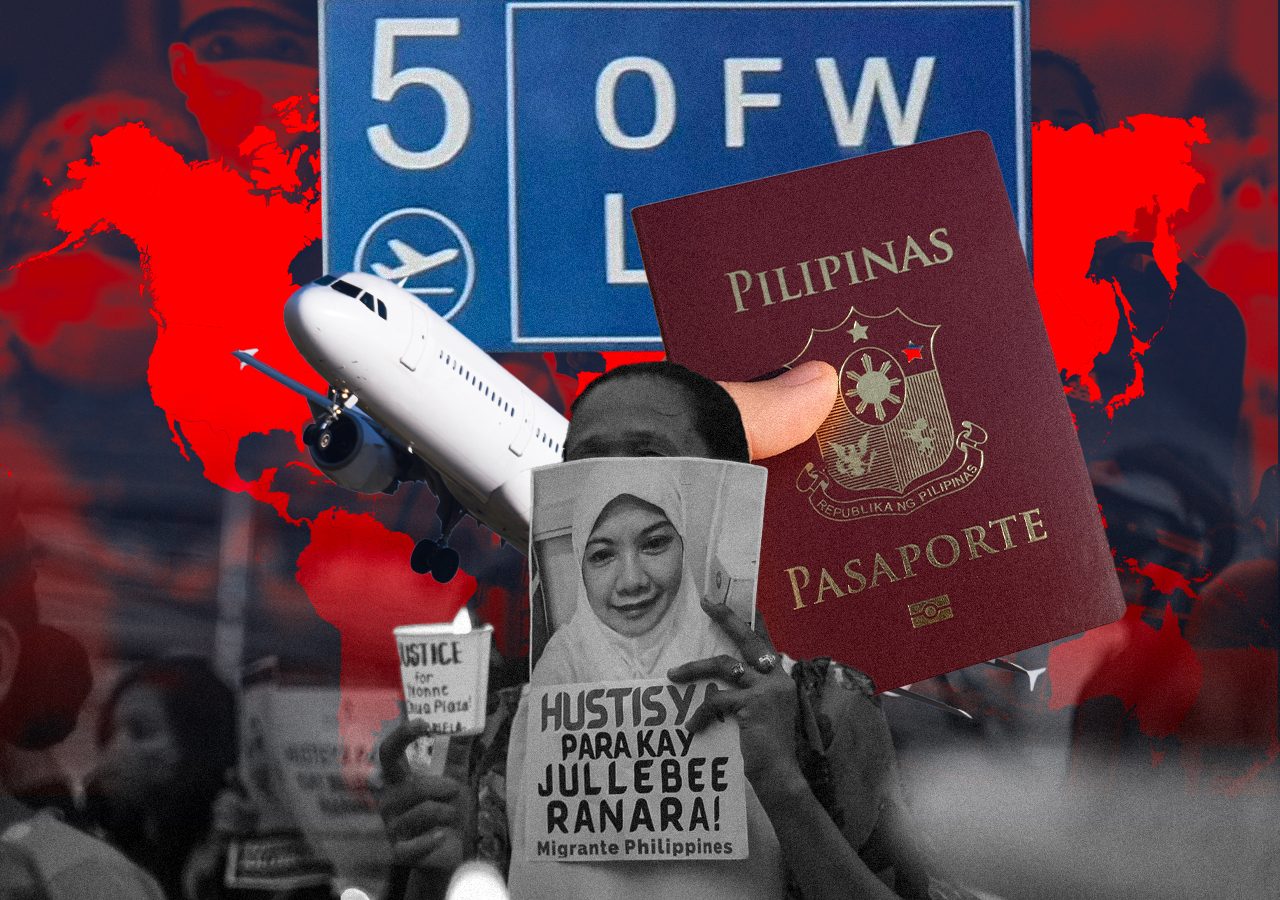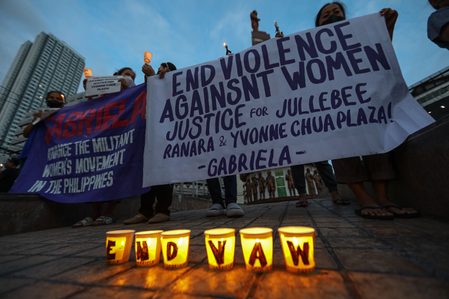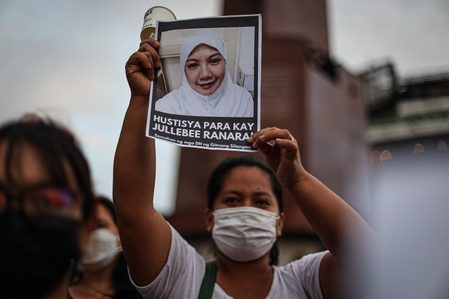SUMMARY
This is AI generated summarization, which may have errors. For context, always refer to the full article.

MANILA, Philippines – On Sunday, February 5, another ill-fated overseas Filipino worker (OFW) was laid to rest after working abroad to provide for her family back home.
She was 34-year-old Jullebee Ranara, a domestic worker in Kuwait. Arab media reported that Jullebee was allegedly raped, impregnated, run over, burnt, and dumped in the desert by the 17-year-old son of her employer. The minor has since been apprehended.
Jullebee follows the thousands of cases of abuse reported in Kuwait and the rest of the Middle East. There were 4,302 cases of OFW maltreatment recorded in the Middle East in 2020, according to Senator Joel Villanueva’s data from overseas labor offices. But the true picture could be much grimmer, as the Philippine embassy in Kuwait reported almost 6,000 cases of abuse there in 2017.
Jullebee’s specific motivations for going abroad remain unknown to the public for now. However, her migration was a manifestation of the long-standing labor export policy of the Philippine government since the administration of late dictator Ferdinand E. Marcos, up until the administration of his son, President Ferdinand Marcos Jr.
Following Jullebee’s killing, Marcos Jr. said that the Philippines was scheduling bilateral talks with Kuwait that would further protect OFWs.
Why do so many Filipinos work abroad?
Many Filipinos are likely to have a relative, or at least know someone, who works abroad. The Philippine Statistics Authority (PSA) pegs the number of OFWs as of 2021 at 1.83 million – majority (60%) of whom are women.
Around 43.2% of OFWs are in “elementary occupations,” which the PSA describes as the performance of routine tasks like cleaning, restocking supplies, simple tasks in food preparations, and deliveries. Some studies categorize domestic workers under this category.
The Philippine government’s labor export program traces its roots to the first Marcos administration. In an At Home sa Abroad episode on Rappler, University of the Philippines Diliman political science professor Jean Franco said the “dismal” performance of the economy at the time and sky-high unemployment caused by the world oil crisis of 1973 were among the reasons why the earlier Marcos administration decided to pursue a state-sponsored labor export program.
In a May 2022 interview, James Zarsadiaz, director of the Yuchengco Philippine Studies Program at the University of San Francisco, said the mass migrations of Filipino workers during this time were due to a “perfect storm” of factors. These included Filipinos wanting to pursue economic opportunities abroad, while some were escaping the economic and political situation in the country that arose from the dictatorship.
Today, labor export remains a pillar of the Philippines’ economic strategy. In 2021, data from the World Bank showed that remittances from OFWs accounted for 9.3% of the Philippines’ gross domestic product. According to Franco, overseas Filipinos also contribute largely to consumption, such as through buying real estate and sending their children to private schools.
OFW remittances also fill in the gaps in the country’s social welfare policies, as families who depend on their OFW relatives can spend for health instead of relying on the state to provide for healthcare services.
With OFW remittances reaching a record-breaking $31.4 billion in 2021, it is difficult to imagine the Philippines without labor export. After all, the Philippines put up a Department of Migrant Workers (DMW) in December 2021, which Franco said, is an indication of the government’s plan to export workers for the “long haul.”
Migrant Workers Secretary Susan Ople said in a Malacañang briefing in January that her department aims to deploy more workers in 2023, noting that the Philippines fielded 486,673 OFWs from July to November 2022.
Costs
The effects of the deeply entrenched labor export program vary among the families that depend on OFW remittances. Because Filipinos are able to seek opportunities abroad, there are families who are uplifted from poverty, but many children of OFWs continue to aspire to work abroad due to intergenerational poverty.
Normalized labor migration also contributes to “brain drain” in the country, Franco said, which happens when highly skilled Filipino workers leave the country to work elsewhere. Some Filipino workers undergo “deskilling,” which means having a job that does not match their educational attainment, due to demand and better pay.
One example would be a licensed Filipino doctor who goes abroad to work as a nurse because that host country is hiring nurses, and is willing to pay competitively against what a doctor earns in the Philippines. Some OFWs with backgrounds in education also choose to do domestic work abroad as these jobs sometimes offer bigger salaries than what local private schools offer.
“Some of [the Filipinos working in elementary occupations] are actually college graduates. And that’s because of the fact that our higher education institutions churn out a lot of college graduates every year who are unable to find jobs here in the Philippines,” said Franco.
“But of course we cannot blame them [health workers who go abroad], given that our government cannot even afford to upgrade their salaries and also provide them with a decent working environment, given the state of our public hospitals,” Franco added.
Meanwhile, the social cost of labor migration also remains an ever-present effect, especially as women go abroad to work and leave their children behind.
“When men started leaving in the 70s to work as construction workers in the Middle East, the so-called social cost of migration was not really talked about. It was only when women started leaving [to go] abroad to work as domestic workers, nannies, and caregivers, that the discourse of social cost was heightened…. It’s not the fault of women for leaving abroad to work – they do this for their families,” said Franco.
Kind, funny Jullebee
Jullebee left behind a husband and four young children.
While family members and friends of Jullebee declined or did not respond to requests to be interviewed on record, a few of them wanted to say one thing: she was kind. Her TikTok account is filled with videos of her dancing – something she loved to do, according to Bonbon Casimiro, Jullebee’s 26-year-old cousin.
Bonbon was sitting outside the venue of the wake in the morning of Wednesday, February 1. In a chance interview with Rappler, he described Jullebee as kind. He said that he was not all that close to her, but that they had good memories together during a few drinking sessions.
“Masaya naman kainuman ‘yun eh. Laging nagpapatawa sa inuman ‘yun…. Puro nakakatawa ‘yung mga kuwentuhan namin. ‘Yung sasayaw-sayaw lang siya,” he said. (She was fun to drink with. She always made us laugh.… We always told funny stories. She would always just dance.)
Bonbon said that he decided to come visit his cousin in Las Piñas for her wake, commuting through several cities in the metro just to see her one more time “kahit sa picture na lang (even if it’s just her picture).”
Media were not permitted inside the wake, but based on photos released by government officials who visited, Jullebee’s photo was placed on top of her casket, with her body not seemingly visible. DMW Secretary Ople said that she personally observed burns on her body when the family identified her after her body was repatriated from Kuwait.
Bonbon said that he would rather stay in the Philippines than work abroad. If his siblings wanted to work abroad, he said he would discourage them. “Baka may mangyari sa kanila (Something might happen to them),” he said.

Meanwhile, for Vladimir Kabingue, one of the Las Piñas traffic enforcers assigned in the vicinity of the wake, going abroad to work is “just part of life.”
“Sa hirap ng buhay, talagang nakikipagsapalaran eh…. Pagkatapos ng pag-aaral nagpupunta sa ibang bansa. Dito kasi, ‘pag dito ka lang, mahirap makipagsapalaran. Sa ibang bansa kasi, ano yan eh, may suwerte, may malas. Ganoon lang po talaga,” he told reporters on Wednesday.
(With the hardships in life, people will really take risks.… After graduating, they’ll go abroad. Here, if you just stay put, it’s difficult to test your luck. In other countries, there are lucky ones and unlucky ones. That’s just the way it is.)
Kabingue said that if his five-year-old daughter eventually wanted to work abroad, he would be worried for her safety, but he would still support her.
“Mahirap pigilan ‘yung desisyon ng isang tao. Kung ano ‘yung gusto niya, susuportahan ko na lang kung saan niya gusto. Natatakot [ako] sa kabilang banda. Pero ‘yan yung pangarap niya eh. Kaya pag may nangyari, walang sisihan kasi gusto niya ‘yun eh,” he said.
(It’s difficult to stop someone’s decision. If that’s what she wants, I will support her wherever she wants to go. I am also afraid, but that would be her dream. So, if something happens, we can’t blame anyone because that’s what she wanted.)

Creating reason to work at home
When the tragic deaths of other Kuwait-based OFWs like Joanna Demafelis and Jeanelyn Villavende were reported, the Philippines resorted to deployment bans. These were eventually lifted following the establishment of labor reforms that were discussed in bilateral talks, as well as the Kuwaiti government reporting movements in the cases against the perpetrators.
Following Jullebee’s death, Ople thumbed down calls for a deployment ban, confident that the Kuwaiti government was willing to dialogue for additional labor reforms. Ople said that it was in the country’s and workers’ interest to keep pursuing labor diplomacy.
Ople said she was aware that the decision to not impose a ban would be criticized. But are the deployment bans some advocates call for really a protective measure for aspiring migrant workers? Ellene Sana, executive director of nongovernmental organization Center for Migrant Advocacy, told Rappler in an interview that this was not necessarily the case.
“You really need to consider: what can keep people back in the country? But it doesn’t mean you will impose a deployment ban. That’s not the way to go about it. But [instead] to really create conditions [that will make them stay]. Create economic opportunities here, and expedite approvals of reintegration programs,” Sana said.
Sana added that many OFWs the NGO monitored experienced hassle and delays when they tried the government’s reintegration program for returning OFWs. Because of severe delays, some OFWs consider going abroad again.
Jullebee’s killing was not the only case of OFW abuse that made headlines recently. There’s also the cases of OFWs being trafficked to Southeast Asian countries to work in cryptocurrency scams. These reports came as deployment began to pick up as the threat of COVID-19 receded worldwide.
“So, what does that say? Na ang mga tao, desperadong umalis pa rin (That people are still desperate to leave),” said Sana, reflecting on Jullebee and the recent trafficking cases. Sana said that while there should be coordination between the DMW and the Department of Labor and Employment (DOLE) on local job creation, the agencies must also focus on making sure these jobs will allow Filipino families to live comfortably.
“It’s not enough that you have jobs. Because the DOLE may say that we have many jobs to offer. In fact, there are many vacancies. But Filipinos do not always apply for these, because they don’t offer living wages,” Sana said in a mix of English and Filipino.
“Going abroad is an effect of what we do not have here. While indeed there is [demand] overseas for foreign workers – and this is especially so in the case of the Gulf states that have [majority] of their labor force as foreign workers. But this is not the reason they go there. The heavier factor is that they are pushed due to the lack of [good jobs] in the Philippines,” Sana added.
When OFW abuses are reported, militant groups often highlight a call to stop labor export. But professor Franco said this is not as simple as it sounds.
“If you do away with overseas employment policy and our economy is not yet ready to accept returning migrants, then they will be unemployed, and that would significantly affect our economy once again. And if you end the labor export program, and there’s great demand abroad, then our kababayans abroad would no longer be protected because the government will not be there to protect them.”
Franco said she salutes OFW rights advocates, as they lobbied for the numerous policies and programs that protect OFWs today. “But I also think that aside from seeking protection, we should also scale up our advocacy or our call to the government to scale up its job-generating programs so that we can finally, slowly, painstakingly overcome our dependence on overseas employment,” she said.
One example of a good practice Franco cited is the Professional Regulation Commission’s conduct of special licensure examinations for teachers (LET) in Hong Kong, so that OFWs with education backgrounds can become licensed teachers and work in the Philippines again. The government put up a “Sa Pinas, Ikaw ang Ma’am/Sir” program in 2015, which facilitates the return of OFW LET passers to teach in the Philippines.
‘Exit plan’
Irene Guinto, together with husband Kris Mutuc, are proud owners of a pasalubong (souvenir) store on CAA Road, across where Jullebee’s wake was held.
While they did not meet Jullebee nor her family personally, the couple knew that she lived across the street from their store. They said Jullebee’s family had their own little store, where they sold grilled street food and soft drinks.

Like Jullebee, Irene and Kris were Filipino migrant workers in the Middle East. Irene was a single mother who left the Philippines to provide for her then-three-year-old child. She met Kris in Dubai a few years after she arrived.
Irene and Kris worked in the airline industry in Dubai for 14 years before coming home to the Philippines in 2020. Kris was part of a pandemic-induced lay-off, while Irene had the choice to stay. But the couple decided that Irene would resign, and they would put up a business in the Philippines with their savings, even as the pandemic hurt local businesses severely.
“It was risky. We decided to be brave. We did not want to be employees anymore because that’s where we came from. So we changed our life paths and decided to do business. It required a lot of courage because the pandemic was really bad at the time,” Irene said in Filipino.
Asked if they would allow their child to work abroad someday, Kris said that “as much as possible,” he would not want their family to be separated.
“If you’re going to go abroad, you should have an exit plan. Because if you don’t have an exit plan, you’re going to be stuck there. And if you get stuck there, the next thing you know, you might be 50 years old and still working there,” said Kris.
“Life is difficult in the Middle East. In Dubai, it’s okay. I know because I’ve been there and people are kind. I don’t know about Kuwait…. Other than the United Arab Emirates, I wouldn’t be in favor, especially if my child were a girl,” he added. – Rappler.com
Add a comment
How does this make you feel?












![[EDITORIAL] Apat na taon na lang Ginoong Marcos, ‘di na puwede ang papetiks-petiks](https://www.rappler.com/tachyon/2024/07/animated-bongbong-marcos-2024-sona-day-carousel.jpg?resize=257%2C257&crop=280px%2C0px%2C720px%2C720px)
![[In This Economy] Delulunomics: Kailan magiging upper-middle income country ang Pilipinas?](https://www.rappler.com/tachyon/2024/07/in-this-economy-upper-middle-income-country.jpg?resize=257%2C257&crop=421px%2C0px%2C1080px%2C1080px)

![[EDITORIAL] Marcos Year 2: Hilong-talilong](https://www.rappler.com/tachyon/2024/07/animated-bongbong-marcos-2nd-sona-carousel.jpg?resize=257%2C257&crop=136px%2C0px%2C720px%2C720px)
![[Newspoint] A fighting presence](https://www.rappler.com/tachyon/2024/07/thought-leaders-a-fighting-presence.jpg?resize=257%2C257&crop=441px%2C0px%2C1080px%2C1080px)
There are no comments yet. Add your comment to start the conversation.